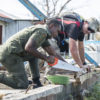By Mr J. Seabrook and Mr K. Loomans,
To sum it up in a single sentence: without effective communication and transparency in a command team, that team will not be viable.
The 21st Century has seen a drastic evolution in the nature of command teams. With Millennials’ occupation of command roles at both platoon and sub-unit level, understanding the core tenets to establishing robust communication and reliable transparency in command teams ought to be re-examined and discussed. Ever-questioning Millennial leaders must squarely identify what lines of effort will best enable their part in a command-team relationship and the effectiveness of the command team as a singular.
The most toxic command teams are often defined by personnel failing to adequately communicate; publicly displayed contradictory positions on a regular basis; and, inadequate commitment to the team construct. Any leader, enlisted or commissioned, who prioritises themselves, their reputation, or their experiences, is unlikely to create and maintain a strong command team. These failings become evident, even to private soldiers, eroding all confidence in that chain of command. Needless to say, morale can be poor on a good day if a command team is not in synch.
After some consideration we have boiled this subject down to five key topics with some background. Wherever a platoon commander/platoon sergeant construct is used as an example, these roles are easily substituted by officer commanding/company sergeant-major or commanding officer/regimental sergeant-major teams.
Mutual respect. Plenty of soldiers’ and officers’ experiences in command teams have seen difficulties primarily owing to a poor appreciation of a counterpart. Too regularly, one party fails to adequately respect the expertise the other side brings to the relationship. On the basis of millennial inquisitiveness, it behoves modern command teams (and the institutions that train leaders) to better define what a command team is.
In simplest terms, a command team should be the interdependence of a leadership specialist (officer) and a technical specialist (soldier). Respecting each other for these specialities is paramount. Very few trades in the NZDF train their officers and soldiers to have interchangeable skills – regardless of the professionalism of some individuals. Thus, regardless of natural leadership ability and the building blocks established through non-commissioned officer coursing, appreciating and respecting an officer’s role as leadership specialist will improve a command team’s chances. Likewise, regardless of young-officer and other trade coursing, officers must acknowledge their soldiers’ technical superiority through years of practical application.
Embracing the concept that every soldier and officer’s training has led to differing points in their careers. This ensures a modern military functions, so staying away from each other’s lanes can only support the system. A senior soldier doesn’t need to get into a spreadsheet to help the unit, they need to be out seeing the future SNCOs and developing them to better support leadership teams, plans, and decisions at all levels. Officers should use their understanding of modern processes to enable their call sign. They ought to be looking out more, not necessarily inwards, to provide focus and to ensure their unit/sub-unit is not overworked by nebulous tasks.
Balance must be ensured in respecting each person’s skill set. No officer effectively commands a function they’re unfamiliar with, likewise non-commissioned officers have plenty of leadership experience even if they have not formally learnt staff planning processes. It is only through mutual respect of each other’s specialities and experiences that the sum of greater than the parts in a complimentary command relationship.
Honesty. Honesty in communication is pretty self-explanatory; without it nothing else really happens. This extends to communication with each other, subordinates, peers, and commanders. Admitting when you don’t know something is important, the other half of that team might have the answer. Allowing one’s self to be vulnerable enough to identify when you’re uncertain or out of your depth should immediately result in a stronger relationship through increased support. Likewise, refusing to acknowledge a gap in understanding or a weakness in your capacity can be damaging to the relationship and the element being led.
Notably, honesty is a dynamic and attuned process of creating an authentic environment as a foundation for truthfully and, importantly, tactfully providing free and frank advice. Ill-timed advice will undermine a command-team relationship, whether that’s in front of an inappropriate audience or after the advice was of value. Support in a command relationship is as much in choosing the moment to give free and frank advice, as the advice itself.
Few would support the sergeant that contradicts an agreed view in front of soldiers or superiors. Likewise, allowing a young officer to repeat the errors of their predecessors only hampers the success of the platoon. Choosing to provide quality advice either way across the command team is as much a sign of support as the professionalism required of any leader.
Integral to extending honesty in all aspects is knowing yourself so you can enable others. Being honest in your self-reflection, whether as an officer or NCO, will give you greater advantage when trying to have an impact. Know your reputation and know your grudges. Being open about these any biases makes them more quickly countered. Using tools such as personality tests will assist in the command team knowing itself better, including where some traits counter-balance others. Being honest and open in discussions about one’s own strengths and weaknesses not only allows you to plan against them as a team, but will strengthen the team’s bond in overcoming shortfalls and best employing strengths.
Transparency. Defences that omissions of information are not dishonest don’t pass muster in the 21st Century. In an age of information-at-the-fingertips and interconnectivity with most of your military organisation, failing to pass on relevant information is almost negligence.
This is truest in command teams, where no counterpart should hide things from the other, their soldiers, or their higher headquarters. Acknowledging exceptions for effectiveness (such as surprise drug tests or no-notice exercises), few things will disenfranchise teammates like withholding rationale and reasoning. Just like our soldiers, many in command teams want to know the “why.” It allows everyone to buy into the mission and therefore perform better. Millennial soldiers and officers generationally need to understand why in order to effectively execute an action. Incidentally, understanding why aligns with the Manoeuvrist Approach the NZ Army uses. Explaining intent is fundamental to our way of warfare. As such, statements like, “because I said,” are inexcusable.
There is no necessity in hiding the vast majority of activities, plans, or future intentions, nor in hiding the reason why they are being undertaken. This extends to the reason why one half of a command team is doing something or wants to do something. Good, modern command teams should discuss openly their thoughts, preferences, biases, and rationale for everything from training and aspirations for the task element, to operations each may wish to deploy on, coursing they wish to attend, other opportunities and career goals. By understanding each other’s motivations and goals, we also improve our interoperability in planning and executing tasks. Being transparent, particularly about goals, may identify potential conflicts and planning hurdles. However, this can be managed to prevent a situation going wrong.
Professionalism. As the culmination of comradeship and integrity, NZ Army’s pursuit of excellence through professionalism includes accountability. Few commanders or senior enlisted leaders get to choose their command-team counterpart. Often, neither will necessarily be the other’s ideal choice to work in a command team with – and that is OK. But it is only acceptable if both command team members are willing to act professionally in a manner befitting their rank. People are going to disagree on issues great and small; often disagreement and compromise is how better solutions are forged.
Commanders are obliged to make decisions, but they should listen to and take on board their sergeant’s or warrant officer’s advice. Ignoring the advice guaranteed by the provision of an enlisted off-sider and technical expert is to assume one is better than the institution that creates command teams intentionally.
Sergeants, regardless of personal preferences, need to stick with the decisions made and back their boss in front of their soldiers. A senior technical expert’s opinion reverberates more than any other when providing rationale for command decisions. Disagreements are closed door matters. Respecting this convention will only reinforce perceptions of your professionalism and command-team cohesion.
Further elaborating on the definitions of specialist roles, while technical specialists are bound to uphold standards and ensure compliance, the onus of responsibility falls to the leadership specialist. It is the leader, the officer – not the soldier – who takes that burden along with the liabilities and obligations worn by being empowered to make decisions. To challenge this burden’s delegation may result in less desirable outcomes, especially if enlisted leaders are pulled away from running their elements to justify decisions and thinking.
Feedback (up, down, or sideways) in 21st Century armies cannot abide by contextless statements like, “it’s sh#t, fix it.” Not only must feedback be constructive – even if the formulation of that feedback requires some discussion to tease out why a gut-feel suggests a course of action is wrong – it must also be professional and address the issue. As in dealing with soldiers, by all means give critical feedback, but don’t character assassinate and provide ways how something can be improved.
Modernity. Armies have evolved in step with societies over the last hundred years. Key to successful command team relationships is acknowledging this. Soldiers are no longer less-educated working-class men serving benevolent, university-educated officers, who have bought their commission. Soldiers and officers nowadays come from the same schooling systems and similar middle-class backgrounds. Society has evolved to be more equal, and less stratified. Embracing families and whanau means modern militaries must loosen their grips on every aspect of a soldier or officer’s life.
Likewise, modern commitments demand more of contemporary service personnel than the still-taught throwaway of “dinners together in the housing area” as go-to recommended mechanism for starting a good command team relationship. Modern times require constant reinforcement of a robust command-team relationship. Open discussion ahead of tasks and planning, fluid exchange of advice, knowledge of each other’s lifestyles, families, partners, aspirations, and obligations is paramount. Forced fun will rarely create a stronger team better than genuine conversation and thoughtfulness.
This short list is only an initial suggestion on how to consider better building your future command relationships. Every person represents incalculable variables and as such, we must constantly strive to better understand each other and our roles as a foundation to proving strong and unified leadership.






